Cost Of Living in Mauritius 2026
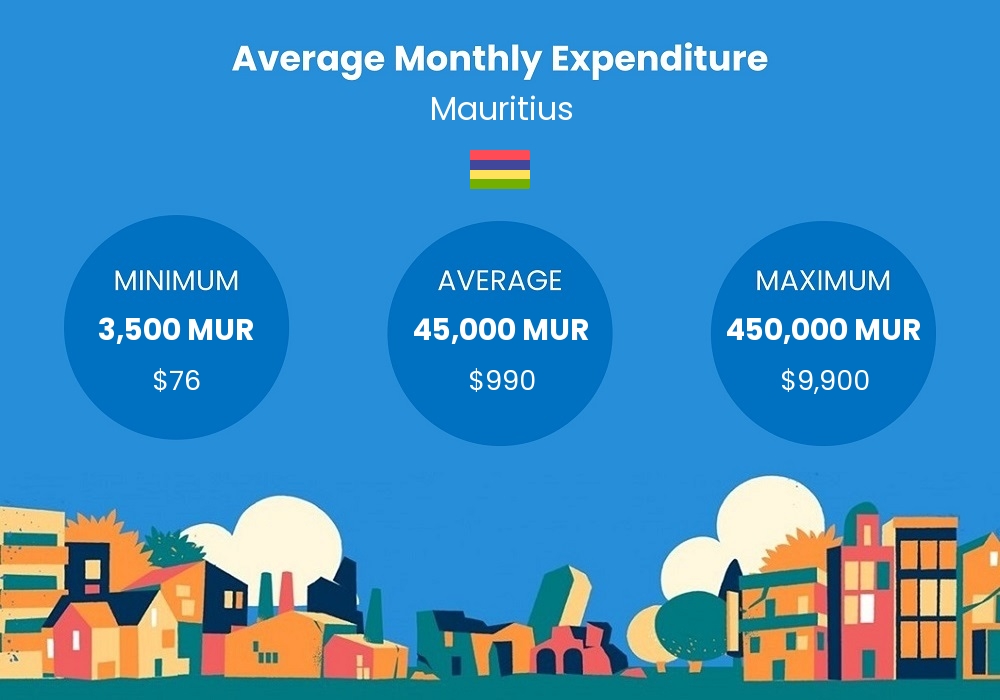
Average monthly spending for singles, couples, students, and families in Mauritius
Whether you're living in Mauritius or planning to move there, it is very important to know the cost of living and the prices of things. Here we list the average spending for the four main population groups.
Average Monthly Expenditure
Currency: MUR

Monthly Expenditure ▶ Single
Currency: MUR

Monthly Expenditure ▶ Couple
Currency: MUR

Monthly Expenditure ▶ Family
Currency: MUR

Monthly Expenditure ▶ Student
Currency: MUR
Prices and cost of goods and services in Mauritius
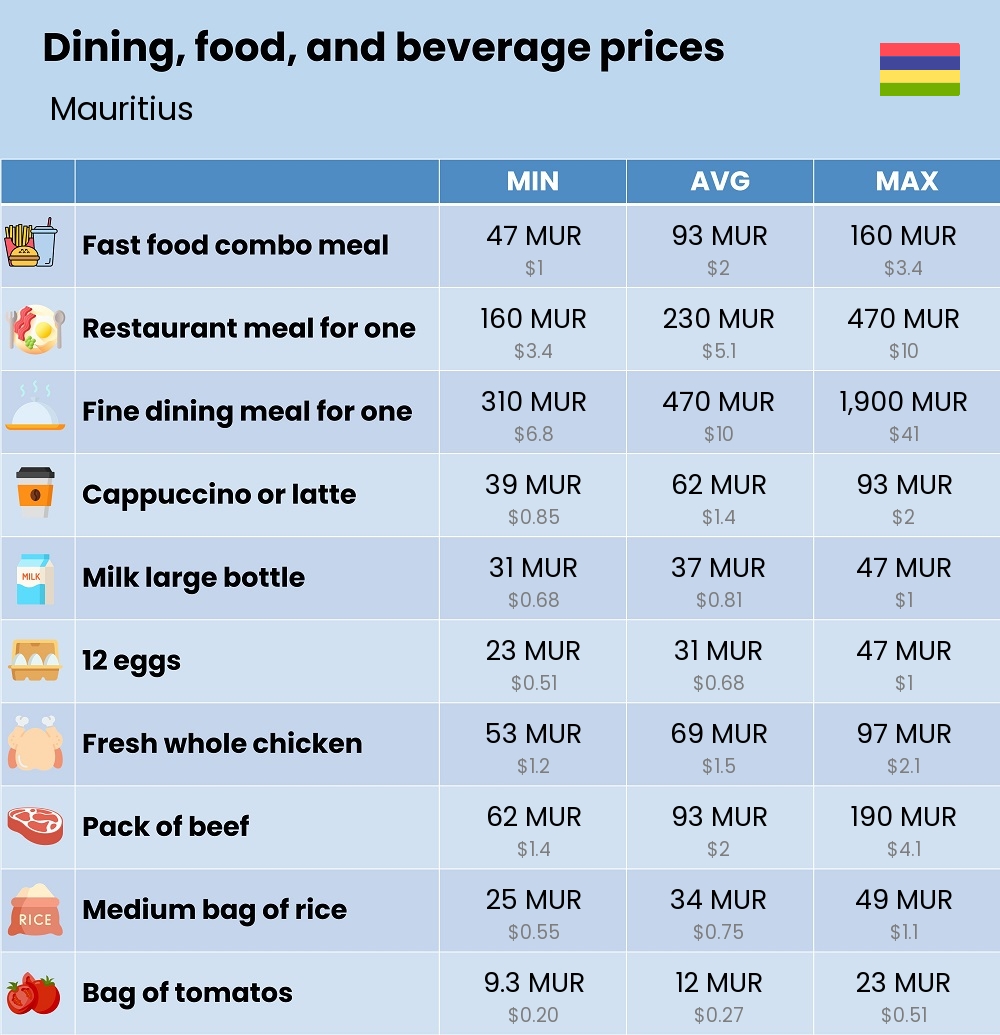
Dining, food, and beverages costs

Fast food combo meal

Restaurant meal for one

Fine dining meal for one
| 310 MUR | 470 MUR | 1,900 MUR |

Cappuccino or latte
Grocery and market costs

Milk large bottle

12 eggs

Fresh whole chicken

Pack of beef

Medium bag of rice

Bag of tomatos

Bag of apples
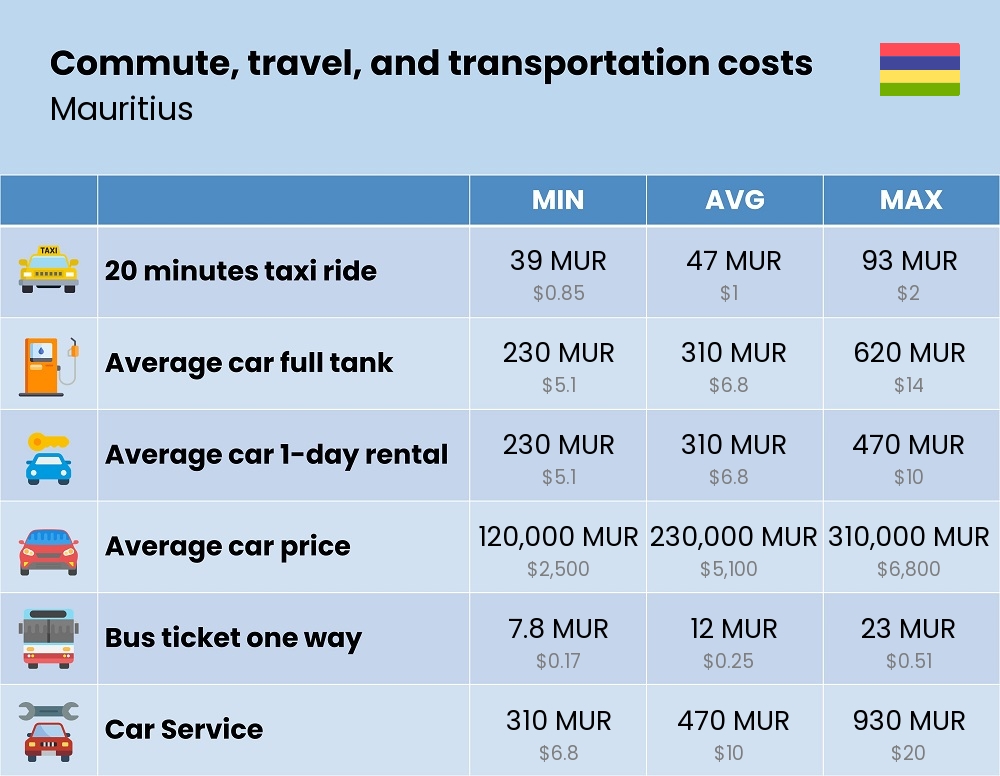
Commute, travel, and transportation costs

20 minutes taxi ride

Average car full tank

Average car 1-day rental

Average car price
| 120,000 MUR | 230,000 MUR | 310,000 MUR |

Bus ticket one way

Car Service
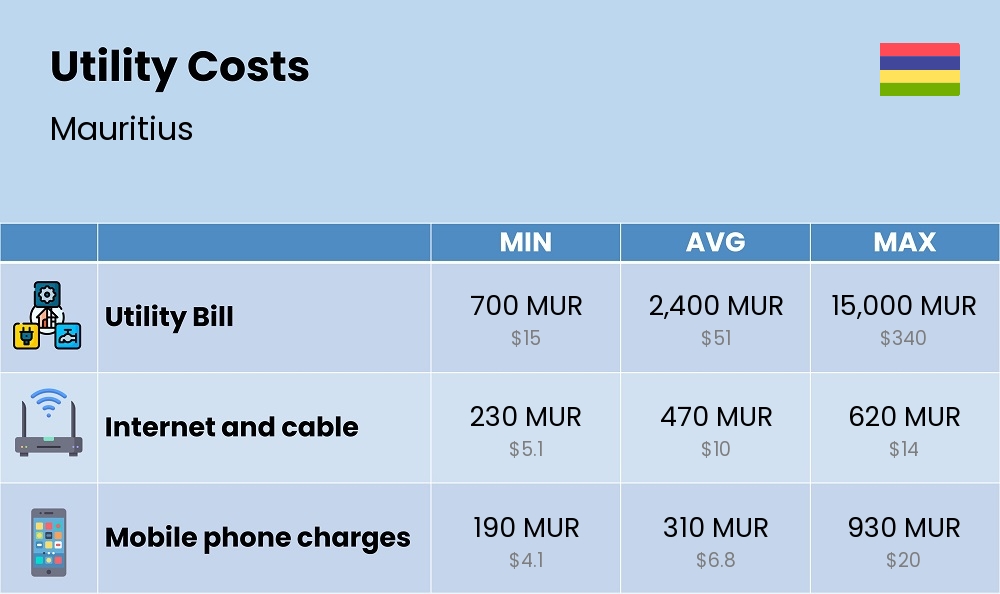
Utility cost (monthly)

Utility Bill - Individual
| 270 MUR | 1,900 MUR | 21,000 MUR |

Utility Bill - Couple
| 280 MUR | 2,000 MUR | 23,000 MUR |

Utility Bill - Family
| 520 MUR | 2,600 MUR | 26,000 MUR |

Internet and cable

Mobile phone charges
Leisure and activities costs

Movie ticket

One month gym membership
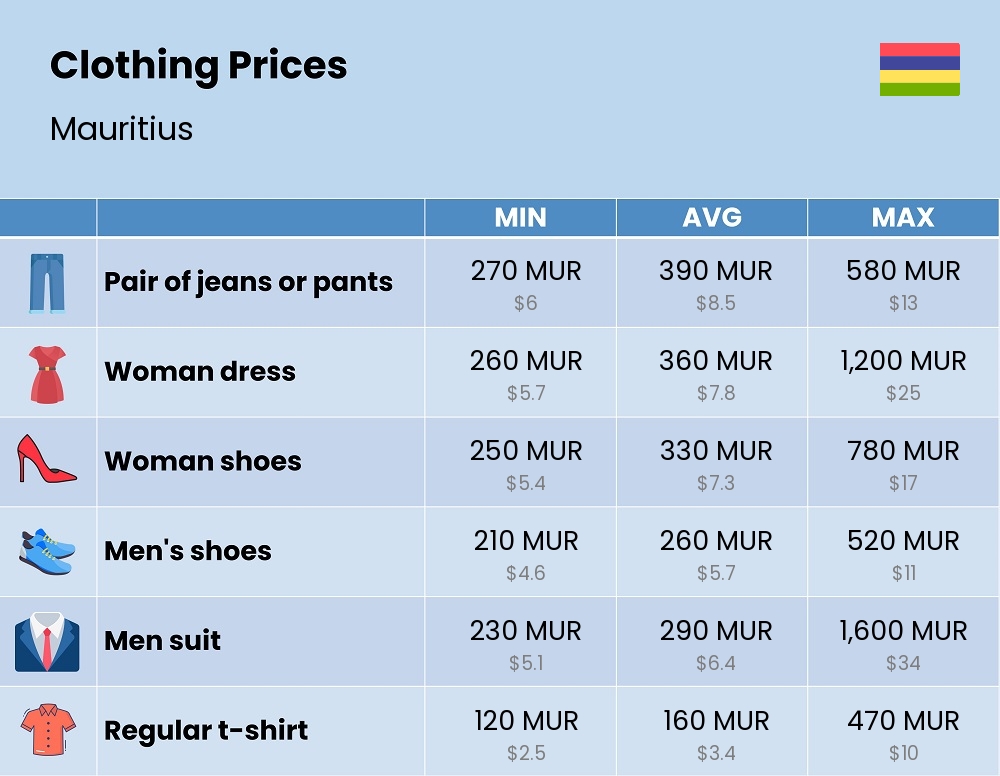
Cloths and accessories costs

Pair of jeans or pants

Woman dress
| 260 MUR | 360 MUR | 1,200 MUR |

Woman shoes

Men's shoes

Men suit
| 230 MUR | 290 MUR | 1,600 MUR |

Regular t-shirt
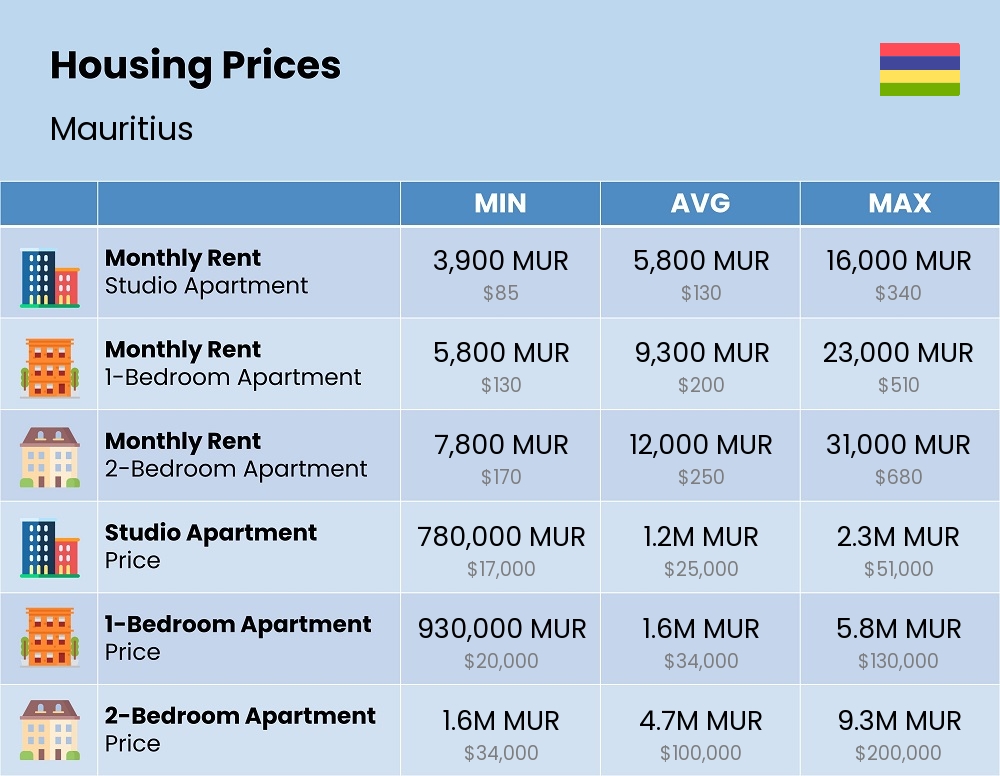
Housing costs / monthly rent

Studio apartment
| 3,900 MUR | 5,800 MUR | 16,000 MUR |

1-bedroom apartment
| 5,800 MUR | 9,300 MUR | 23,000 MUR |

2-bedroom apartment
| 7,800 MUR | 12,000 MUR | 31,000 MUR |
Housing costs / Buying

Studio apartment
| 780,000 MUR | 1.2M MUR | 2.3M MUR |

1-bedroom apartment
| 930,000 MUR | 1.6M MUR | 5.8M MUR |

2-bedroom apartment
| 1.6M MUR | 4.7M MUR | 9.3M MUR |
| $34,000 | $100,000 | $200,000 |
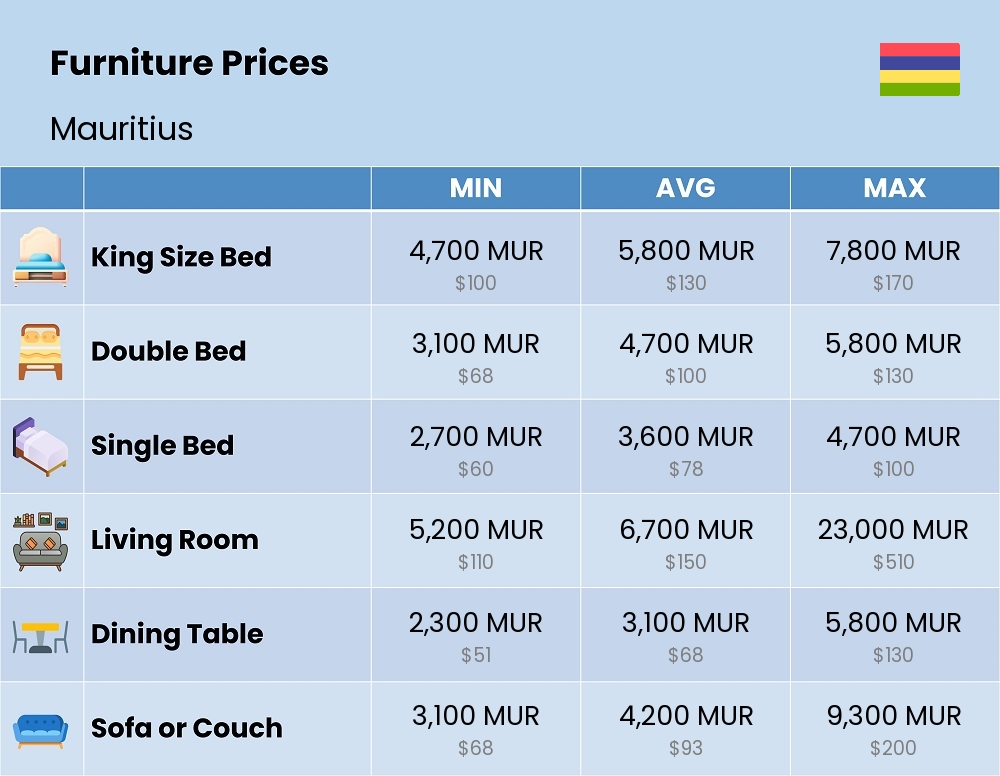
Furniture Costs

King Size Bed
| 4,700 MUR | 5,800 MUR | 7,800 MUR |

Double Bed
| 3,100 MUR | 4,700 MUR | 5,800 MUR |

Single Bed
| 2,700 MUR | 3,600 MUR | 4,700 MUR |

Living Room
| 5,200 MUR | 6,700 MUR | 23,000 MUR |
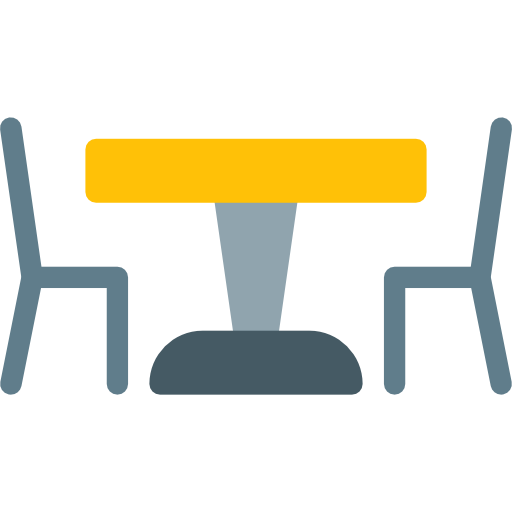
Dining Table
| 2,300 MUR | 3,100 MUR | 5,800 MUR |

Sofa or Couch
| 3,100 MUR | 4,200 MUR | 9,300 MUR |
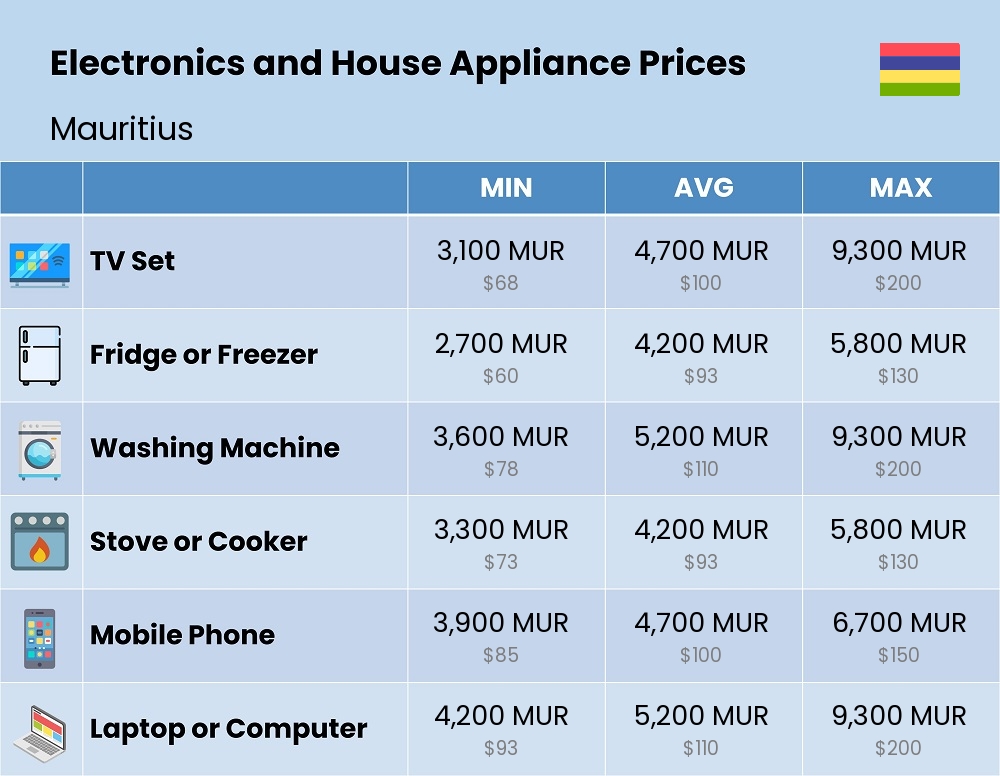
Electronics and House Appliance Costs

TV Set
| 3,100 MUR | 4,700 MUR | 9,300 MUR |

Fridge or Freezer
| 2,700 MUR | 4,200 MUR | 5,800 MUR |

Washing Machine
| 3,600 MUR | 5,200 MUR | 9,300 MUR |

Stove or Cooker
| 3,300 MUR | 4,200 MUR | 5,800 MUR |

Mobile Phone
| 3,900 MUR | 4,700 MUR | 6,700 MUR |

Laptop or Computer
| 4,200 MUR | 5,200 MUR | 9,300 MUR |
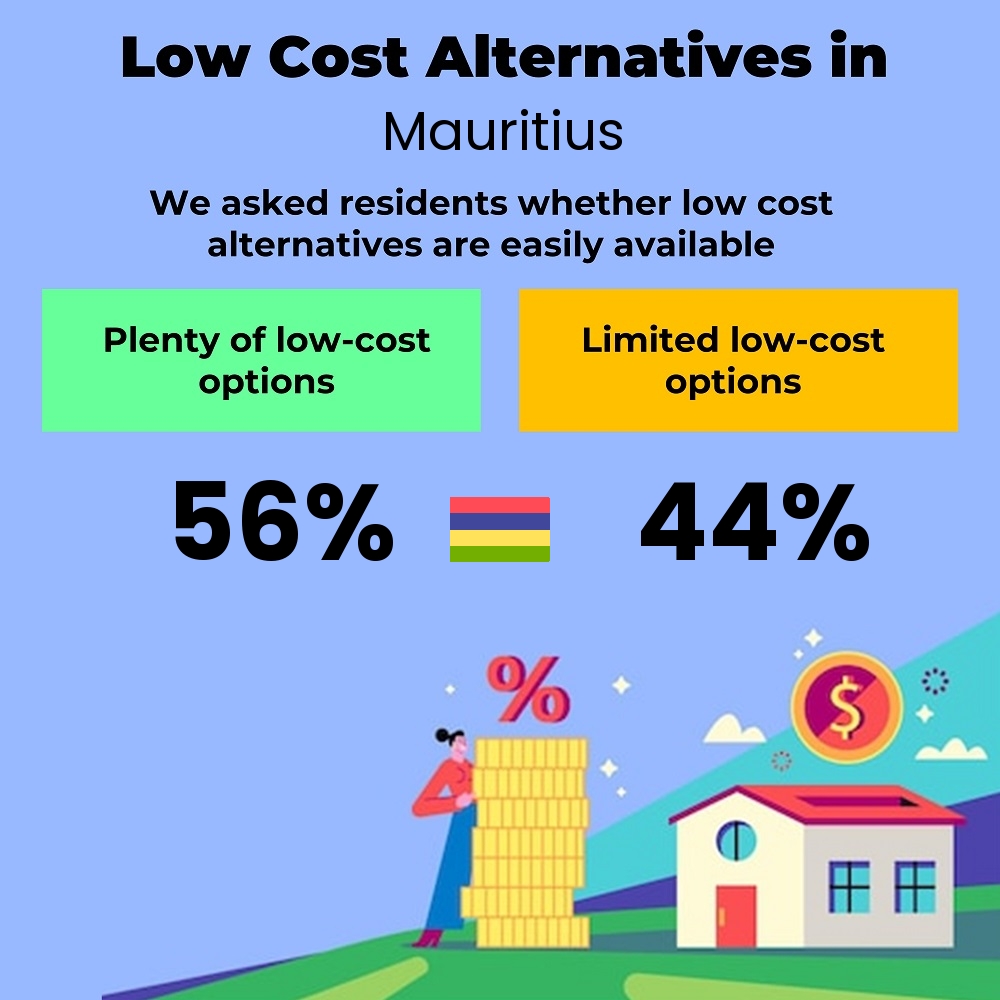
Low-cost alternatives in Mauritius
People are always looking for ways to cut down expenses and reduce expenditures. The hallmark of any affordable place is the availability of discount stores, bargain deals, smart or secondhand shopping, refurbished items, and couponing. We asked residents how easily cost-cutting is and the answers were distributed as follows:
Plenty of low-cost options56%
Few low-cost options44%
Based on the survey, 56% of the people living in Mauritius have no problem finding low-cost alternatives to support a frugal lifestyle while 44% think that thriftness is difficult due to scarcity in discount markets and secondhand outlets.
Expenditure to Income Ratio in Mauritius
One of the most definite ways to determine how affordable a place is measuring the ratio of expenses to salary. A high expense-to-income to ratio indicates a high cost-of-living index while a low expenditure-to-salary ratio means the place is affordable to live in.
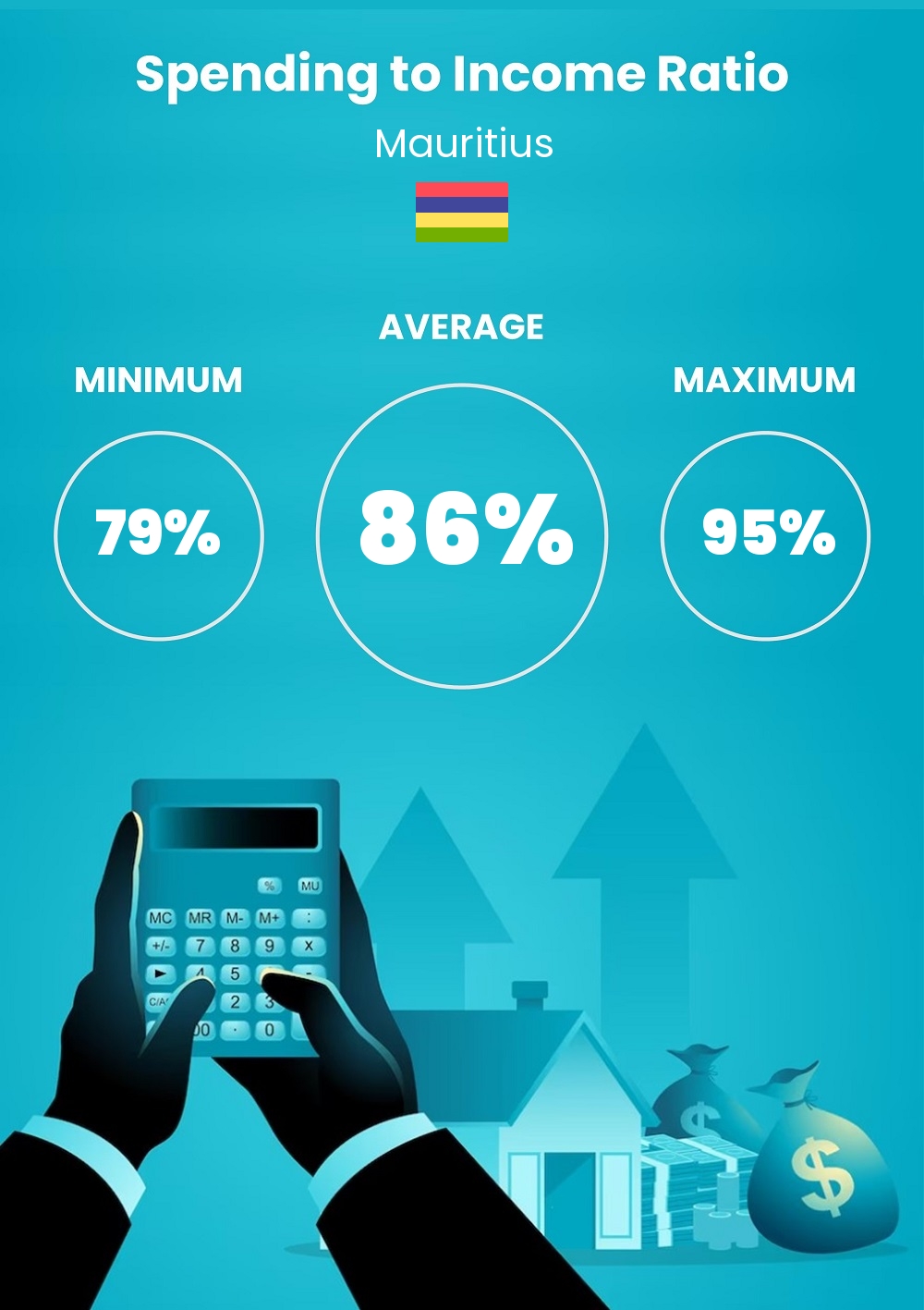
Spending to Income Ratio
86%
79% to 95%
( expenditure / income ) x 100
Expense to income distribution levels
| Spending To Income Ratio | % People |
|---|
| < 50% | 4% |
| 50% - 60% | 9% |
| 60% - 70% | 16% |
| 70% - 80% | 25% |
| 80% - 90% | 19% |
| 90% - 100% | 11% |
| 100% - 110% | 6% |
| 110% - 120% | 4% |
| 120% - 130% | 3% |
| 130% - 140% | 2% |
| > 140% | 2% |
Interpretation and Analysis
The average spending-to-salary ratio in Mauritius is 86%
This means that on average, people spend around 86% of their income for living.
According to the distribution table, 16% of the population spend approximately 60% to 70% of their income every month.
How can spending be more than income?
A value higher than 100% means that the expenditure of those people is higher than their income. They are spending more than what they earn. This is possible in two scenarios. They are either borrowing from their savings to survive or they are borrowing from other sources (relatives, friends, banks, etc.). More about this in the debt section.
 Individual
77%
Spending-Income-Ratio
Individual
77%
Spending-Income-Ratio
71%
86%
 Couple
82%
Spending-Income-Ratio
Couple
82%
Spending-Income-Ratio
75%
90%
 Family
90%
Spending-Income-Ratio
Family
90%
Spending-Income-Ratio
83%
100%
Emergency Funds
An emergency fund is a financial safety net comprised of easily accessible savings set aside to cover unexpected expenses or financial emergencies, typically amounting to three to six months' worth of living expenses. We asked residents whether they have an emergency fund and the answers were as follows.
Yes54%
No46%
Based on the survey, 46% of the people living in Mauritius said that they don't have an emergency fund while 54% said that they do.
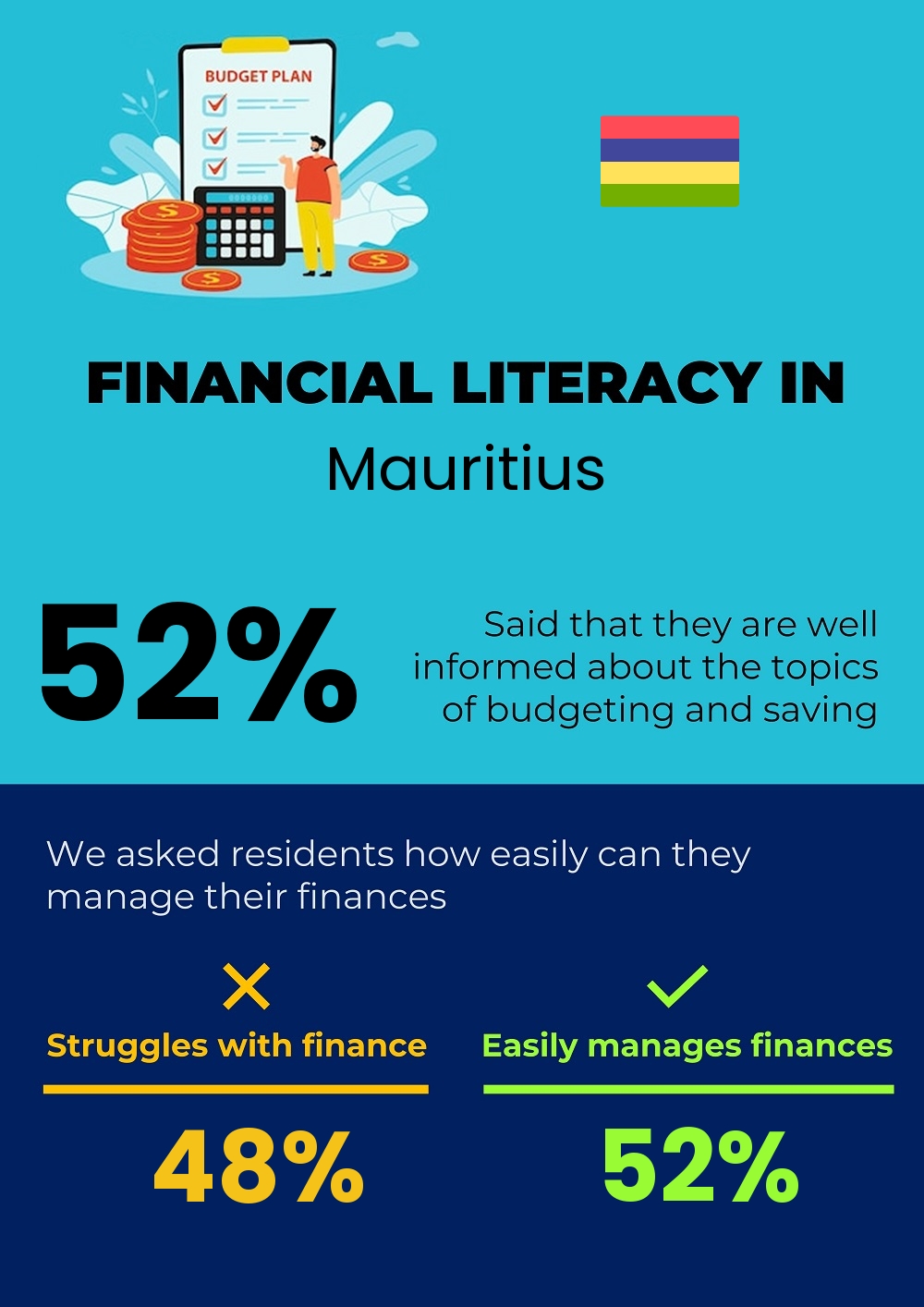
Financial Literacy in
Financial literacy is the knowledge of concepts and principles related to personal finance that allow individuals to make informed decisions regarding their money such as budgeting, saving, investing, borrowing, managing debt, financial risk management, and planning.
Financial Leteracy52%
We asked residents of whether they acquired any adequate personal financial training in their lives. Approximately 48% of the people who participated in the survey said that they are not well informed about the topics of budgeting, saving, etc., and just manage things based on their own experience, while 52% said that they know about the general principles of personal finance from sources other than their own experience.
Difficulty in Budgeting and Financial Planning
We wanted to understand whether residents of have problems or difficulties in managing their expenditures and savings so we asked people one simple question: do you struggle with your personal finances? 48% of the participants reported that they indeed struggle in creating budgets and in organizing their finances while 52% said that they have everything under control.
Struggles with finance48%
Easily manages finances52%
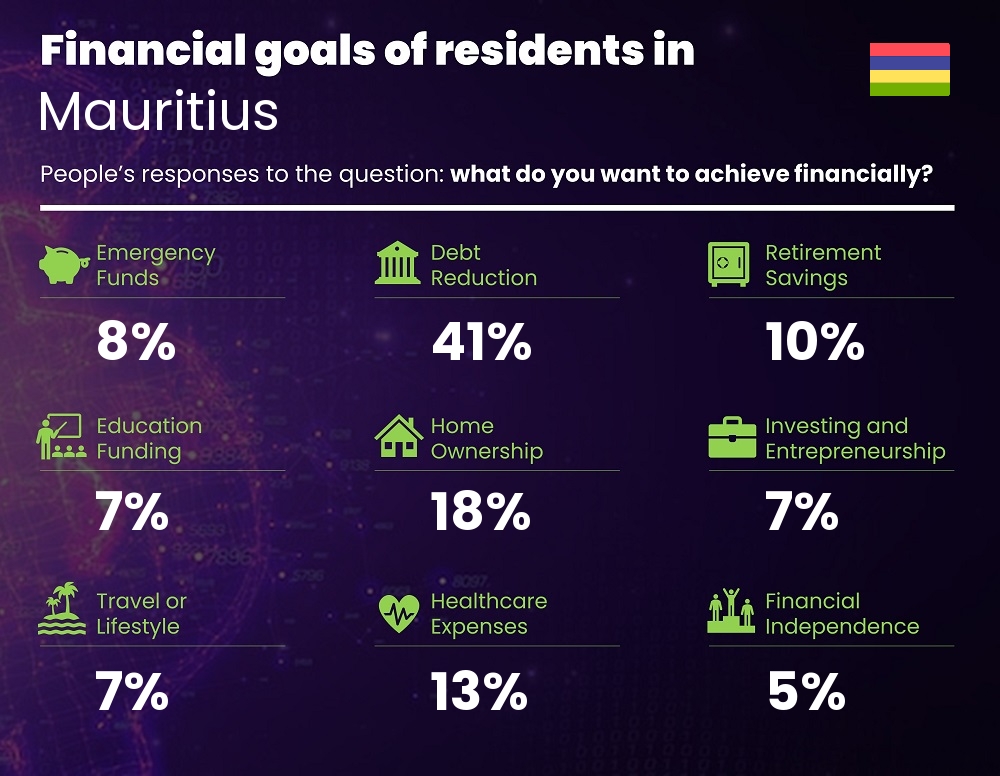
Financial goals of people in Mauritius
In an attempt to understand the economic situation in Mauritius, we asked participants about their financial targets. By knowing what the population in general is trying to achieve, we can shed light on the economic outlook, cost of living, and quality of life in general.
| Financial Goal | % People |
|---|
| Emergency Fund | 8% |
| Debt Reduction | 41% |
| Retirement Savings | 10% |
| Education Funding | 7% |
| Homeownership | 18% |
| Investing | 7% |
| Travel or Lifestyle | 7% |
| Healthcare Expenses | 13% |
| Financial Independence | 5% |
Around 8% of those who participated in the survey said that their main goal is to establish an emergency fund to cover unexpected expenses while 41% said their number one priority is to pay off high-interest debt or loans and improve credit. 10% of surveyed people confirmed that saving for retirement to ensure a comfortable lifestyle in the final years is their main target. Around 7% reported that their priority is saving for the tuition fees and education costs of their children while 18% choose to buy a home or pay off existing mortgage before other things. 7% of the population would like to build wealth through investments such as stocks, bonds, mutual funds, or real estate. For 7% of people, saving for vacations or upgrading their lifestyle is the number one concern. Approximately 13% of the residents said that saving for healthcare expenses including insurance premiums is their main goal.
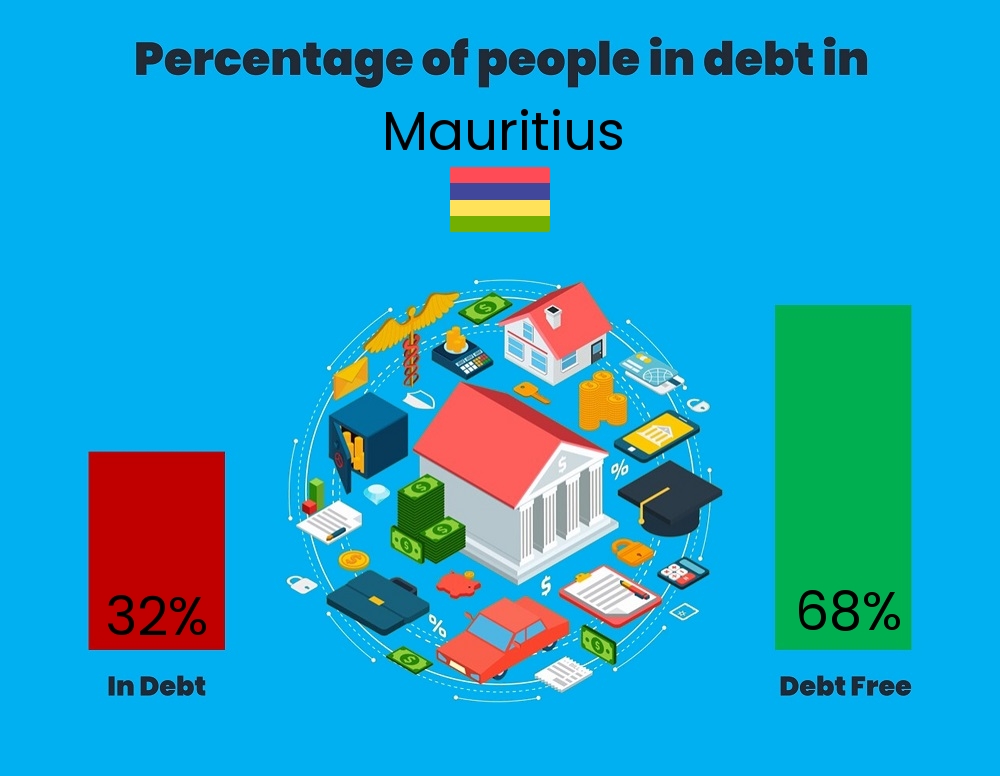
Debt, loans, and mortgages in Mauritius
Percentage of people who are in debt
According to the survey, 32% of the people in Mauritius have some kind of debt, loan, mortgage, or credit card payments while 68% reported that they don't have financial obligations to banks.
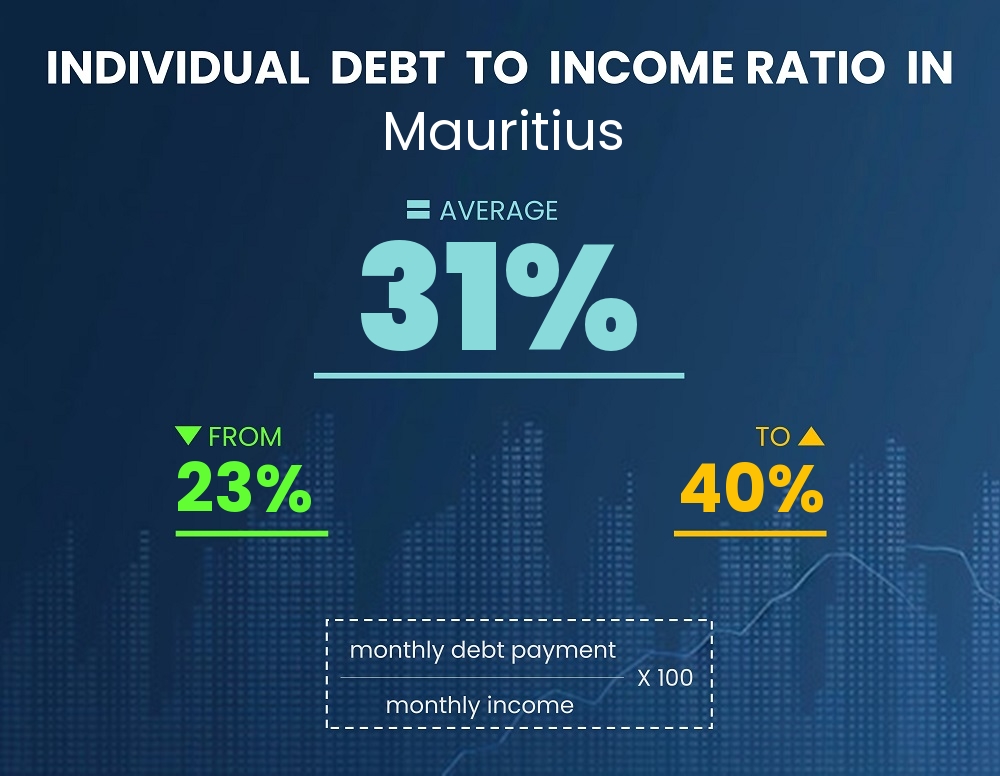
Debt-to-income ratio in Mauritius
Debt to income ratio
31%
23% to 40%
( monthly debt payment / monthly income ) x 100
Interpretation
The debt-to-income ratio measures the percentage of income being paid as debt settlement across the population. It is calculated by dividing the monthly debt settlement payment of an individual by their monthly income. Based on collected data, approximately 31% of the people's monthly income in Mauritius goes to debt settlement.
Debt levelsMonthly debt settlement payment as percentage of monthly income
| Debt-to-income ratio | % People |
|---|
| > 60% | 3% |
| 50% - 60% | 17% |
| 40% - 50% | 14% |
| 30% - 40% | 16% |
| 20% - 30% | 11% |
| 10% - 20% | 13% |
| 0% - 10% | 26% |
According to our data, 3% of the debtors in Mauritius pay 60%+ of their income as debt settlement while 17% of the people pay 50% to 60% of their income for the same, which is quite an alarming financial situation for those individuals. 14% of people in debt dedicate 40% to 50% of their income to loan and mortgage payments while 16% dedicated 30% to 40% of income for same. Things are looking brighter for 11% of individuals as they only pay 20% to 30% of their income for loan and credit card repayment.
Distribution by type of debt in Mauritius
| Debt | % People |
|---|
| Real Estate Mortgage | 9% |
| Auto Loan | 16% |
| Student Loan | 4% |
| Credit Card | 29% |
| Personal Loan | 42% |
9% of debtors in Mauritius confirm that real estate mortgages constitutes the main part of their outstanding debt while 29% say that credit card payments are the reason they are in debt. Auto loans were the main type of debt for 16% of people and personal loans rose at 42%. Lastly, student loans are the main source of debt for 4% of debtors in Mauritius.
About credit score and debt managementManaging debt is a critical aspect of maintaining a favorable credit score. Debt reduction is the first thing you should do improve your financial situation. Getting rid of debt takes precedence over saving money because of interest rates.
Good debt vs. Bad debt
Not all debt is bad. Good debt typically refers to borrowing money for investments that can increase in value or generate income over time like purchasing a home or acquiring student loans. On the other hand, bad debt involves borrowing for things that fail to generate lasting value like high-interest credit card debt used for non-essential expenses like luxury items or vacations.
Loan Affordability Index in Mauritius
Besides measuring the loan-to-income ratio, we asked residents how many times in a year they defaulted or were unable to pay their due credit card or loan payments on time. Understanding how often people default on their due payments is one of the indicators of the cost of living and economic situation.
Frequency and percentage of people who failed to pay their monthly credit card or loan payments on time last year.
| Frequency | % People |
|---|
| Never | 51% |
| Once a year | 24% |
| Twice a year | 12% |
| Three times a year | 9% |
| Four times a year | 4% |
Retirement, pension plans, and life after work in Mauritius
What does the retirement lifestyle look like in Mauritius and how much retirement savings are required?
Retirement age
The retirement age for most employees in is 65 years. Specific retirement ages can vary based on factors like occupation, gender, years of contribution, and location. It is not entirely unlikely for people to retire either before or after this age.
Retirement planning and savings
There are many retirement saving options, some are personally initiated and others are government-sponsered. Regardless of the source of savings, the minimum amount of money that needs to be put aside to ensure a peaceful and comfortable retirement at each age can be found in the table below. This data is largely approximated and can vary drastically based on individual needs and situations. Treat these figures as a general guideline.
The typical saved amount of money you should have at every age as multiples of monthly salary:| Age | Amount |
|---|
| 25 | 5x monthly salary at age 25 |
| 30 | 10x monthly salary at age 30 |
| 35 | 15x monthly salary at age 35 |
| 40 | 25x monthly salary at age 40 |
| 45 | 32x monthly salary at age 45 |
| 50 | 48x monthly salary at age 50 |
| 55 | 56x monthly salary at age 55 |
| 60 | 64x monthly salary at age 60 |
| 65 | 78x monthly salary at age 65 |
The typical average saved amount of money you should have at every age in Mauritius:| Age | Amount |
|---|
| 25 | 93,000 MUR |
| 30 | 190,000 MUR |
| 35 | 330,000 MUR |
| 40 | 470,000 MUR |
| 45 | 700,000 MUR |
| 50 | 980,000 MUR |
| 55 | 1.2M MUR |
| 60 | 1.4M MUR |
| 65 | 1.7M MUR |
Retirement Income Distribution
We asked residents about their retirement income sources and below are the results.
| Source | % People |
|---|
| Pensions | 12% |
| Savings | 23% |
| Investments | 12% |
| Social Security | 7% |
| Annuities | 7% |
| Part-time Job | 14% |
| Real Estate | 18% |
| Dividends and Interest | 7% |
Retirement Monthly Expenses in Mauritius 2,600 MUR
$56 | 23,000 MUR
$500 | 260,000 MUR
$5,600 |
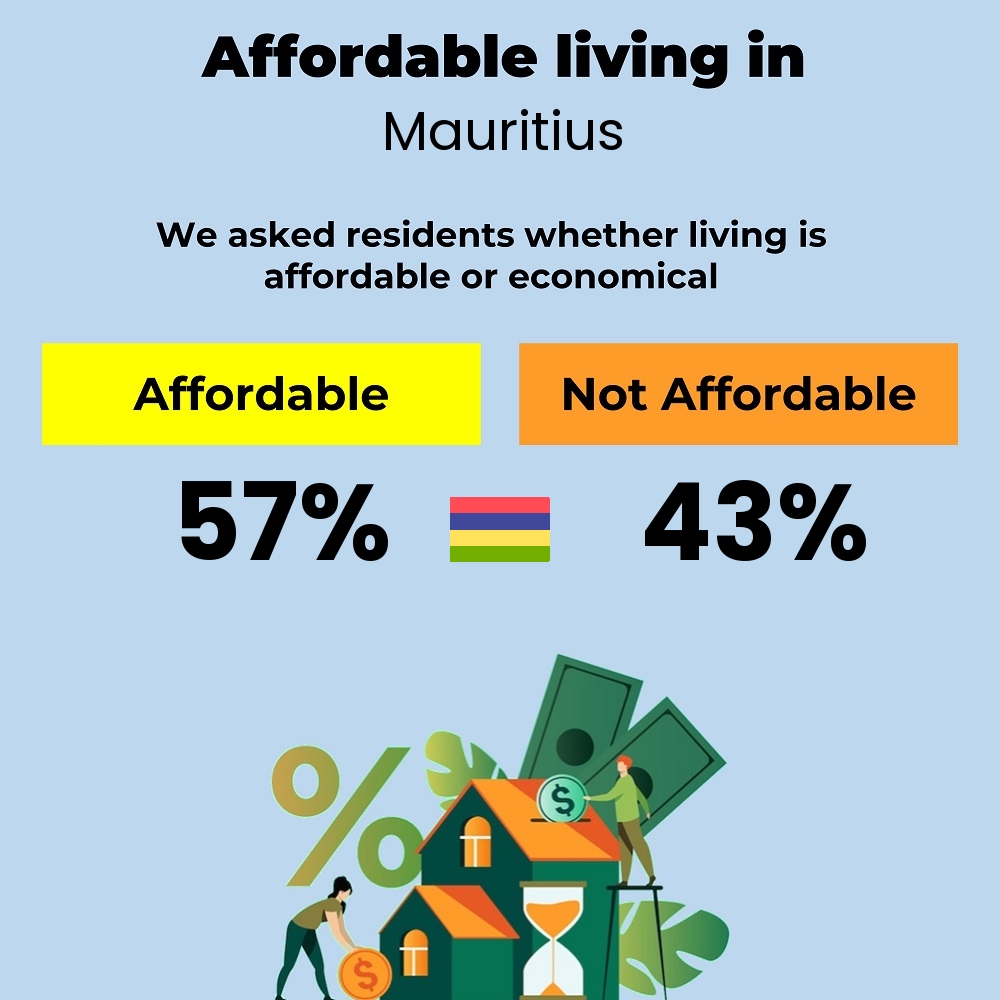
Affordable living in Mauritius
Income and cost of living compatibility
We asked residents one simple question and recorded their answers.
Is it affordable or economical to live in Mauritius?
Around 57% of surveyed residents think that living in Mauritius is affordable with proper budgeting while 43% reported that it is just too expensive and not affordable even with frugality and thriftness.
Food Prices, Dining Expenses, and Grocery Costs in Mauritius
Grocery / Food expenditure and prices can vary drastically between different areas and locations.
Prices and cost of goods and services in Mauritius
Dining out, food, and beverages costs. Price variations for common food items.

Fast food combo meal price
The average price of a regular combo meal at a fast food outlet or chain like McDonald's, Pizzahut, or KFC in Mauritius is approximatly 93 MUR with meal cost ranging from 47 MUR to 160 MUR. The typical combo meal consists of a burger, french fries, and a drink.

Restaurant meal for one price
If you are planning to have a nice meal at a mid-range restaurant, expect to pay anywhere between 160 MUR and 470 MUR with 230 MUR being the average price of a plate for one person at a regular restaurant in Mauritius.

Fine dining meal for one price
| 310 MUR | 470 MUR | 1,900 MUR |
The price range of a meal at fine-dining restaurant is 310 MUR to 1,900 MUR with the average cost being 470 MUR for one person. This is what you would expect to pay a top-tier diner in Mauritius.

Beverage prices, cappuccino, latte etc..
The average price of a regular beverage like cappuccino or latte at Starbucks, Costa, or similar coffee shops and cafes in Mauritius is around 62 MUR. Price ranges between 39 MUR and 93 MUR depending on the type of beverage, the size, and optional add-ons.
Grocery and market costs

Large bottle of milk price
The average price of a large bottle of milk in Mauritius is 37 MUR. The maximum what you would pay for milk is 47 MUR and the minimum being 31 MUR depending on the brand of milk and other properties.

12 eggs price
A dozen eggs costs around 31 MUR on average with 23 MUR and 47 MUR being the lower and upper limits respectively.

Fresh whole chicken price
The price range of a fresh whole chicken in Mauritius is between 53 MUR and 97 MUR depending on the size of the chicken and whether it is oraganic or not. The average price is approximatly 69 MUR.

Pack of beef price
The price of a regular pack of beef or meat is around 93 MUR. A pack of beef contains around 1Kg or 1lb depending on packing.

Medium bag of rice price
A bag of rice in Mauritius costs around 34 MUR on average with prices rangeing between 25 MUR and 49 MUR depending on the brand and quality.

Bag of tomatos price
A bag of tomatoes costs anywhere from 9.3 MUR to 23 MUR. A bag of tomatoes denotes 1Kg or 1lb depending on location.

Bag of apples price
A bag of apples costs 22 MUR on average. A bag of apples denotes 1Kg or 1lb depending on location.
Grocery and food expenditure to income ratio
( monthly grocery expenses / monthly income ) x 100
The average grocery-to-income ratio in Mauritius is around 27%. This means that people spend 27% of their income on grocery and basic household items. The expenditure can range from 19% to 33% depending on salary and location.
Expenditure on food and grocery for every population group
A single person living alone spends approximately 5,000 MUR per month on grocery and food with expenditure fluctuating between 710 MUR and 56,000 MUR depending on location and the type of person. The average cost of food and groceries for a couple is around 6,300 MUR per month. That number can be get as low as 980 MUR or a high as 59,000 MUR. Families' spending on grocery ranges from 1,900 MUR to 94,000 MUR with the location, income, and size of the family being the most determinite factors.
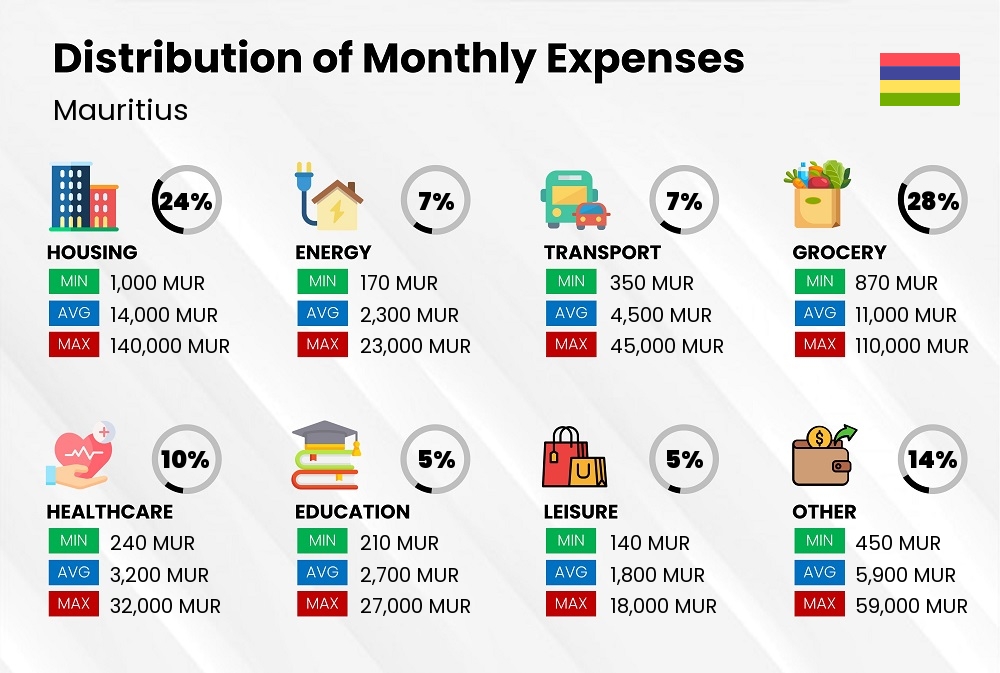
How do people spend their money in Mauritius?
We asked thousands of people about their spending habits and expenditure breaks. Below are their answers.
The percentage figures in this section are percentages of total spending not income. If you would like to see the percentage of expenses as related to income or salary, see other sections.
Housing Expenditure24%
24% of total expenses on average (13% to 32%)
| LOW | $23 1,000 MUR |
| AVERAGE | $230 10,000 MUR |
| HIGH | $3,400 160,000 MUR |
| Per Month |
People living in Mauritius typically spend from 13% to 32% of their total monthly expenditure on housing with 24% being the average. The average spend on housing is 10,000 MUR with expenditure ranging from 1,000 MUR to 160,000 MUR. This cost mainly goes for rent but it also includes other accommodation-related expenses. Housing costs are highest for families and lowest for students as expected.
Utilities, Electricity, Water, Internet, Mobile7%
7% of total expenses on average (4% to 11%)
| LOW | $3.8 170 MUR |
| AVERAGE | $38 1,700 MUR |
| HIGH | $570 26,000 MUR |
| Per Month |
Utility expenditure like electricity, water, and gas in Mauritius ranges from 4% to 11% of total expenses with 7% being the average. The average monthly cost of utilities is 1,700 MUR with 170 MUR and 26,000 MUR being the upper and lower limits.
Transport, Fuel, Commute7%
7% of total expenses on average (3% to 11%)
| LOW | $7.6 350 MUR |
| AVERAGE | $76 3,500 MUR |
| HIGH | $1,100 52,000 MUR |
| Per Month |
Fuel consumption and cost of transport depend heavily on whether you live near your work or school, but roughly speaking you would expect to spend from 350 MUR to 52,000 MUR on commuting with 3,500 MUR being the norm for most people in one month. This means that money spent on transport constitutes about 7% of total spending on average but can go as low as 3% or as high as 11%.
Food and Groceries Cost28%
28% of total expenses on average (20% to 34%)
| LOW | $19 870 MUR |
| AVERAGE | $190 8,700 MUR |
| HIGH | $2,900 130,000 MUR |
| Per Month |
The average outlay on groceries in a month in Mauritius is 8,700 MUR. The cost of groceries can range between 870 MUR to 130,000 MUR. People spend on average about 28% on food and groceries with upper and lower bounds of 20% and 34% respectively.
Healthcare and Medical Services10%
10% of total expenses on average (5% to 13%)
| LOW | $5.3 240 MUR |
| AVERAGE | $53 2,400 MUR |
| HIGH | $800 37,000 MUR |
| Per Month |
People in Mauritius allocate 5% to 13% of their total monthly expenditure to healthcare including health insurance and out-of-pocket medical expenses. The average spending is around 10%. The range of medical expenses range from 240 MUR to 37,000 MUR with 2,400 MUR being the norm.
Leisure and Shopping5%
5% of total expenses on average (2% to 9%)
| LOW | $3 140 MUR |
| AVERAGE | $30 1,400 MUR |
| HIGH | $460 21,000 MUR |
| Per Month |
This category mostly contains discretionary or non-essential expenses but also some non-discretionary spending like furniture for example. The monthly expenses range from 140 MUR to 21,000 MUR with 1,400 MUR being the average. Speaking of percentages, that equates to 2% to 9% of total expenses with an average of 5% for most residents.
Education and Schooling5%
5% of total expenses on average (3% to 11%)
| LOW | $4.6 210 MUR |
| AVERAGE | $46 2,100 MUR |
| HIGH | $690 31,000 MUR |
| Per Month |
Spending on education can vary drastically between different people. While working singles can spend 0% on education, families and students' expenditure can reach up to 22%. On average, education constitutes 5% of the monthly expenditure with 3% and 11% being the lower and upper bounds respectively. The average reported education cost is 2,100 MUR per month with 210 MUR being the minimum spent amount and 31,000 MUR being the maximum.
Other Expenses14%
14% of total expenses on average (9% to 21%)
| LOW | $9.9 450 MUR |
| AVERAGE | $99 4,500 MUR |
| HIGH | $1,500 68,000 MUR |
| Per Month |
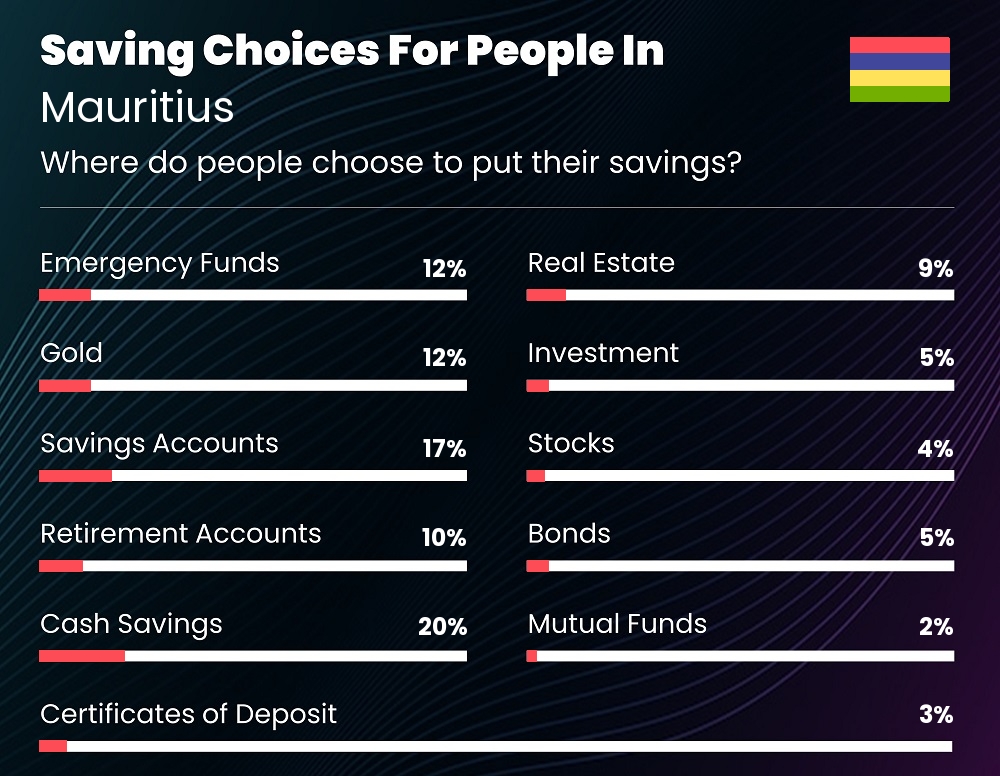
Typical saving choices for people in Mauritius
Where do people choose to put their savings?
| Saving Type | % People |
|---|
| Emergency Funds | 12% |
| Gold | 12% |
| Savings Accounts | 17% |
| Retirement Accounts | 10% |
| Cash Savings | 20% |
| Real Estate | 9% |
| Investment | 5% |
| Stocks | 4% |
| Bonds | 5% |
| Mutual Funds | 2% |
| Certificates of Deposit | 3% |
The figures displayed here are inclusive of everything: housing, travel, groceries, healthcare, etc.
Singles
The average monthly expense for a single person living in Mauritius is 31,000 MUR. Expenses can range from 4,400 MUR at the minimum level to 350,000 MUR at the highest end.
Couples
The average monthly spending of couples in Mauritius is 45,000 MUR. Expenditure can range from 7,000 MUR to 420,000 MUR per month.
Families
The average cost of living for families in Mauritius is 52,000 MUR per month. Families spend anywhere from 10,000 MUR to 520,000 MUR.
Students
The average monthly expenditure for students in Mauritius is 23,000 MUR. Students spend from 3,500 MUR to 260,000 MUR per month.
Spending behavior can change drastically from one person to another. It is best to consider the minimum, average, and maximum spending together.
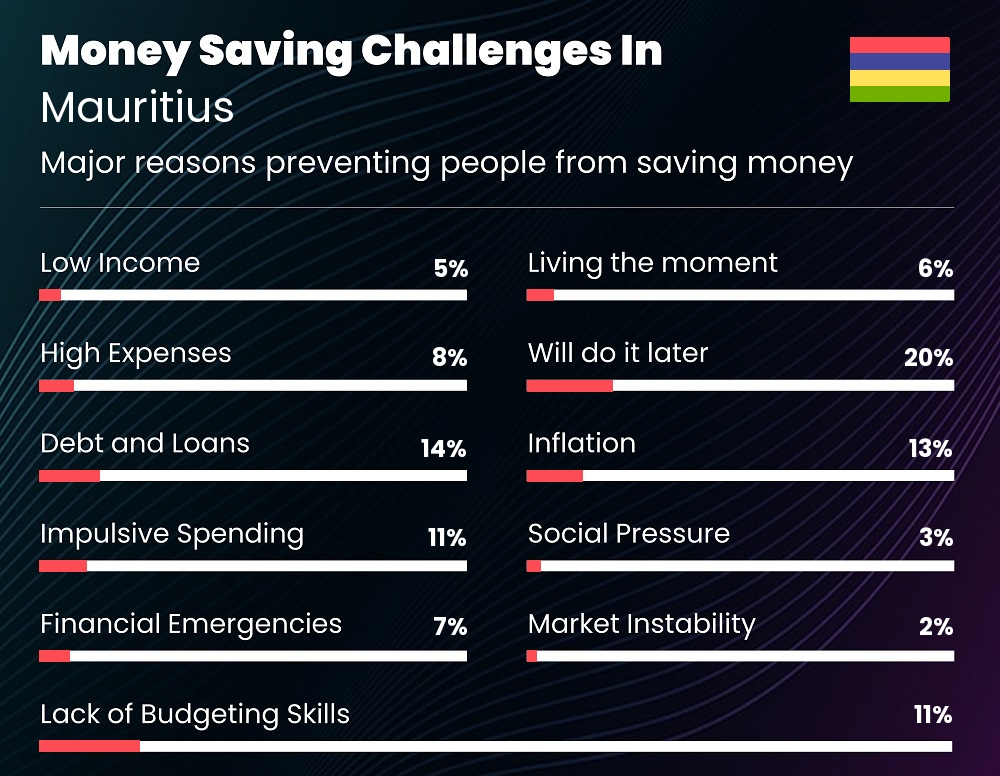
Saving Challenges in Mauritius
Reasons that make it difficult for people to save money
We wanted to understand what is stopping people from maximizing their savings in Mauritius. Listed below are the answers given by the survey participants.
| Reason | % People |
|---|
| Low Income | 5% |
| High Expenses | 8% |
| Debt and Loans | 14% |
| Lack of Budgeting Skills | 11% |
| Impulsive Spending | 11% |
| Financial Emergencies | 7% |
| Living the moment | 6% |
| Will do it later | 20% |
| Inflation | 13% |
| Social Pressure | 3% |
| Market Instability | 2% |
Around 5% of the people said that their salary is too low to accommodate a portion for savings while 8% said that the high cost of living leaves little room for savings. 14% of the residents said that they are burdened with debt and find it challenging to save money. 11% reported that they just don't have the knowledge or discipline to create and stick to a budget, leading to overspending and an inability to save. 11% blamed impulsive spending as the reason for saving inability. Around 7% said that unexpected expenses like medical bills or car repairs are derailing their savings goals. 6% bluntly said that they don't see the purpose of it and prefer to live each day to the fullest. 20% reported that they understand the value of saving but are putting off saving for the future, thinking they have plenty of time to start later. 13% blamed inflation, saying that every time they save some money they end up using it immediately. A surprising 3% said that social pressure and keeping up with peers or social expectations makes them overspend. Lastly, 2% blamed market instability and price fluctuations.
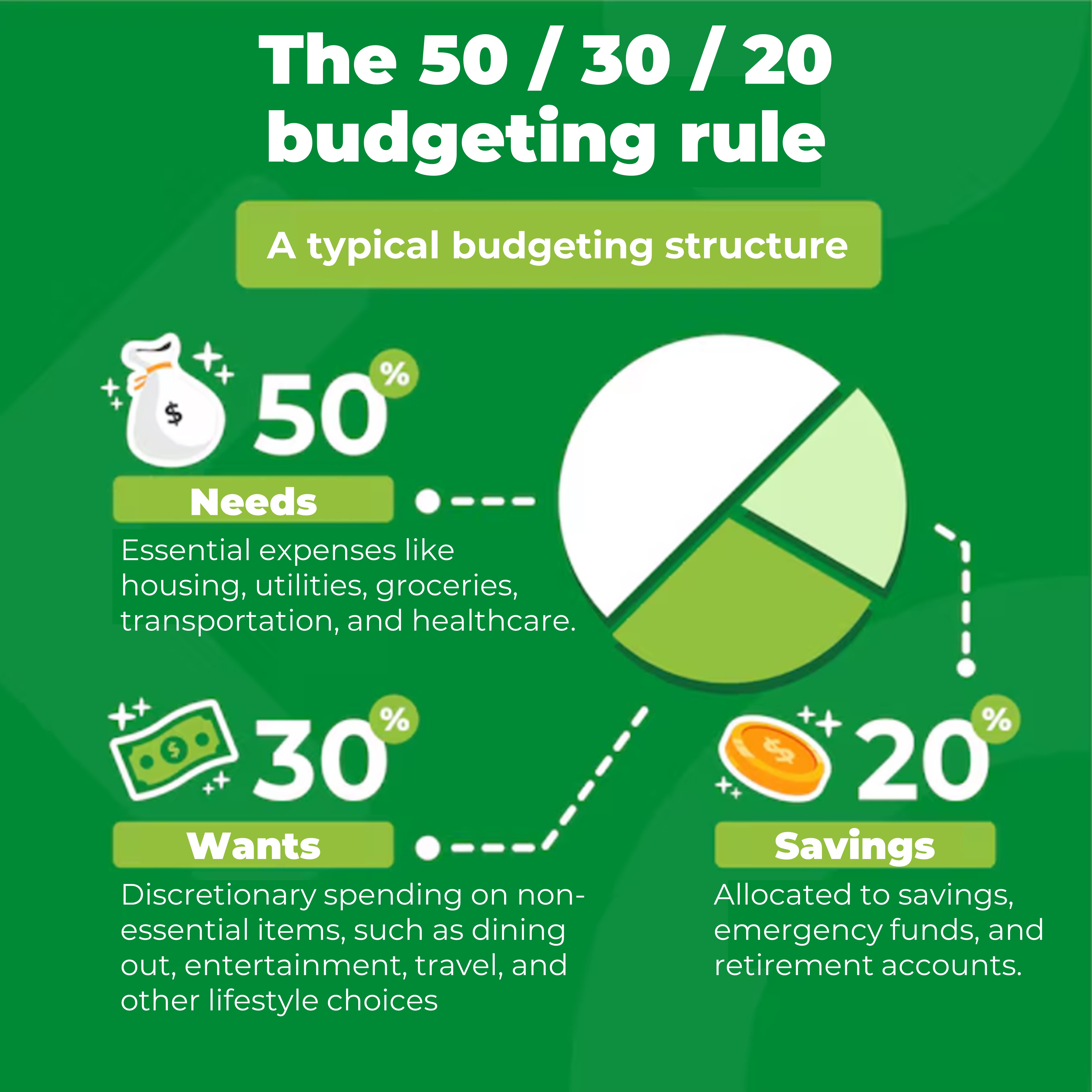
A typical and healthy budgeting structure
The 50/30/20 rule
Spending among different people can vary significantly based on factors such as their income, lifestyle,
location, and personal preferences. A commonly used guideline for budgeting is the 50/30/20 rule,
which suggests allocating your income into three main categories in the following percentages.
50% for needs and financial obligations
This category includes essential expenses like housing, utilities, groceries, transportation, and healthcare.
30% for wants and discretionary spending
This category covers discretionary spending on non-essential items, such as dining out, entertainment, travel, and other lifestyle choices.
20% for savings and emergency fund
This is the percentage that must be allocated to savings, emergency funds, and retirement accounts.
About financial planning, money management, and household budgeting
The 50/30/20 rule is used as a general guideline but may not be the best choice for all people. There are in fact many budgeting plans out there like the 70/20/10 and the 60/20/20 rules, all claiming to be the best. More important than all of this is to establish financial discipline by creating a budget tailored to your specific financial goals and situation. It is very important that your financial outflow be less than your income to maintain a healthy cash flow.
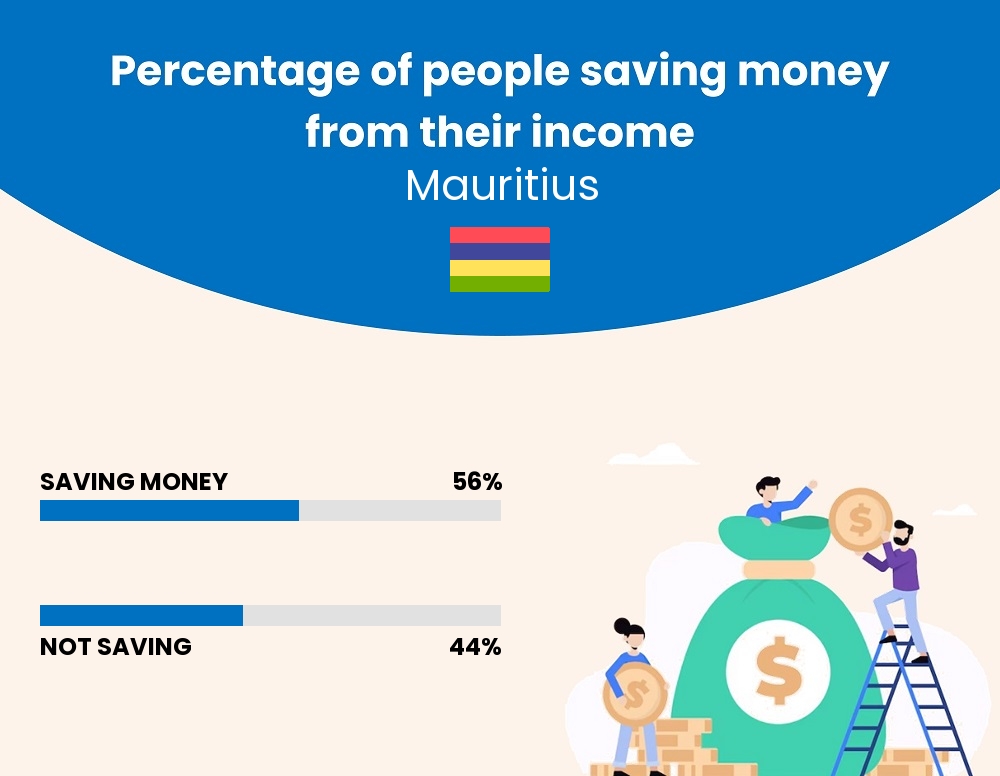
How much money can you save in Mauritius every month?
We asked thousands of people what percentage of their income can they save in a month. Below are the answers.
What percentage of people in Mauritius manage to save money from their income every month?
Almost 56% of the surveyed people in Mauritius said that they can save some money at the end of each month while 44% said that aren't saving anything.
Percentage of people saving money by population group in Mauritius
| Group | Savers | Non Savers |
|---|
| Singles | 63% | 37% |
| Couples | 58% | 42% |
| Families | 53% | 47% |
Savings-to-Income Ratio
The savings-to-income ratio is measured as the percentage of income that people save over a specific period and it is simply calculated by dividing the saved money by total income and then multiplying the result by 100. (Savings / Income) x 100.
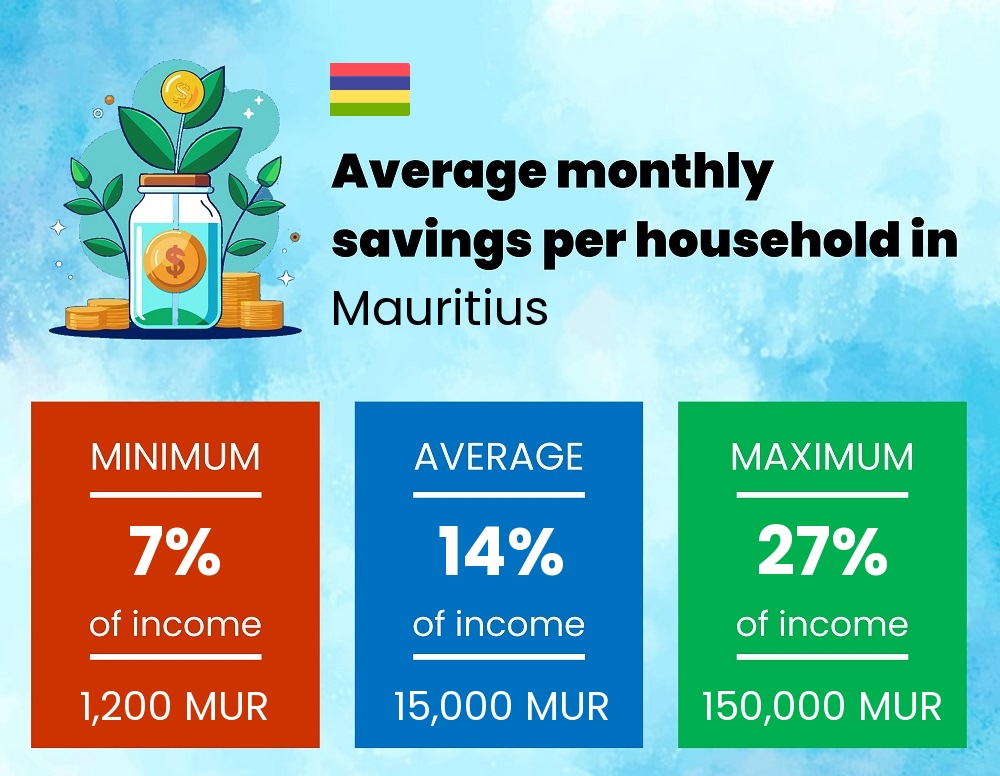
Saving to Income Ratio
Average Monthly Saved Amount
1,200 MUR
$26 | 12,000 MUR
$260 | 180,000 MUR
$3,800 |
For most people, 7% to 27% of their monthly income is what they can allocate to their savings, with 14% being the average. The amount of money that people can save is approximately 12,000 MUR on average with savings ranging from 1,200 MUR to 180,000 MUR.
63% of surveyed singles reported some of their income going to savings while 58% of couples said the same. 53% of families confirmed their ability to save money.
How much money do people actually save in Mauritius?
The amount of money that people can afford to save depends hugely on their income. It is better to focus on the percentage when trying to understand saving patterns.
 Singles
Singles
Saving to Income Ratio
Average Monthly Saved Amount
1,200 MUR
$26 | 11,000 MUR
$230 | 120,000 MUR
$2,600 |
Savings to income distribution levels for singles
| Saving To Income Ratio | % Singles |
|---|
| 0% - 10% | 33% |
| 10% - 20% | 26% |
| 20% - 30% | 17% |
| 30% - 40% | 12% |
| 40% - 50% | 9% |
| > 50% | 3% |
Interpretation and Analysis
Singles who can afford to save reported that they allocate from 10% to 29% of their monthly income to savings, with 18% being the average for most singles. The average amount of money that singles are able to save is 11,000 MUR with 1,200 MUR and 120,000 MUR being the minimum and maximum respectively.
 Couples
Couples
Saving to Income Ratio
Average Monthly Saved Amount
2,300 MUR
$51 | 15,000 MUR
$330 | 140,000 MUR
$3,100 |
Savings to income distribution levels for couples
| Saving To Income Ratio | % Couples |
|---|
| 0% - 10% | 37% |
| 10% - 20% | 28% |
| 20% - 30% | 20% |
| 30% - 40% | 7% |
| 40% - 50% | 6% |
| > 50% | 2% |
Interpretation and Analysis
Couples who confirmed their ability to save reported saving equivalent to 8% to 28% of their monthly income, with 16% being the average for most couples. The average amount of money that couples can save is 15,000 MUR with 2,300 MUR and 140,000 MUR being the minimum and maximum respectively.
 Families
Families
Saving to Income Ratio
Average Monthly Saved Amount
3,500 MUR
$77 | 18,000 MUR
$380 | 180,000 MUR
$3,800 |
Savings to income distribution levels for families
| Saving To Income Ratio | % Families |
|---|
| 0% - 10% | 40% |
| 10% - 20% | 31% |
| 20% - 30% | 21% |
| 30% - 40% | 4% |
| 40% - 50% | 3% |
| > 50% | 1% |
Interpretation and Analysis
Families in Mauritius can save anywhere between 7% to 26% of their monthly income, with 13% being the average for most families. The average amount of money that families can put aside is 18,000 MUR with 3,500 MUR and 180,000 MUR being the minimum and maximum respectively.
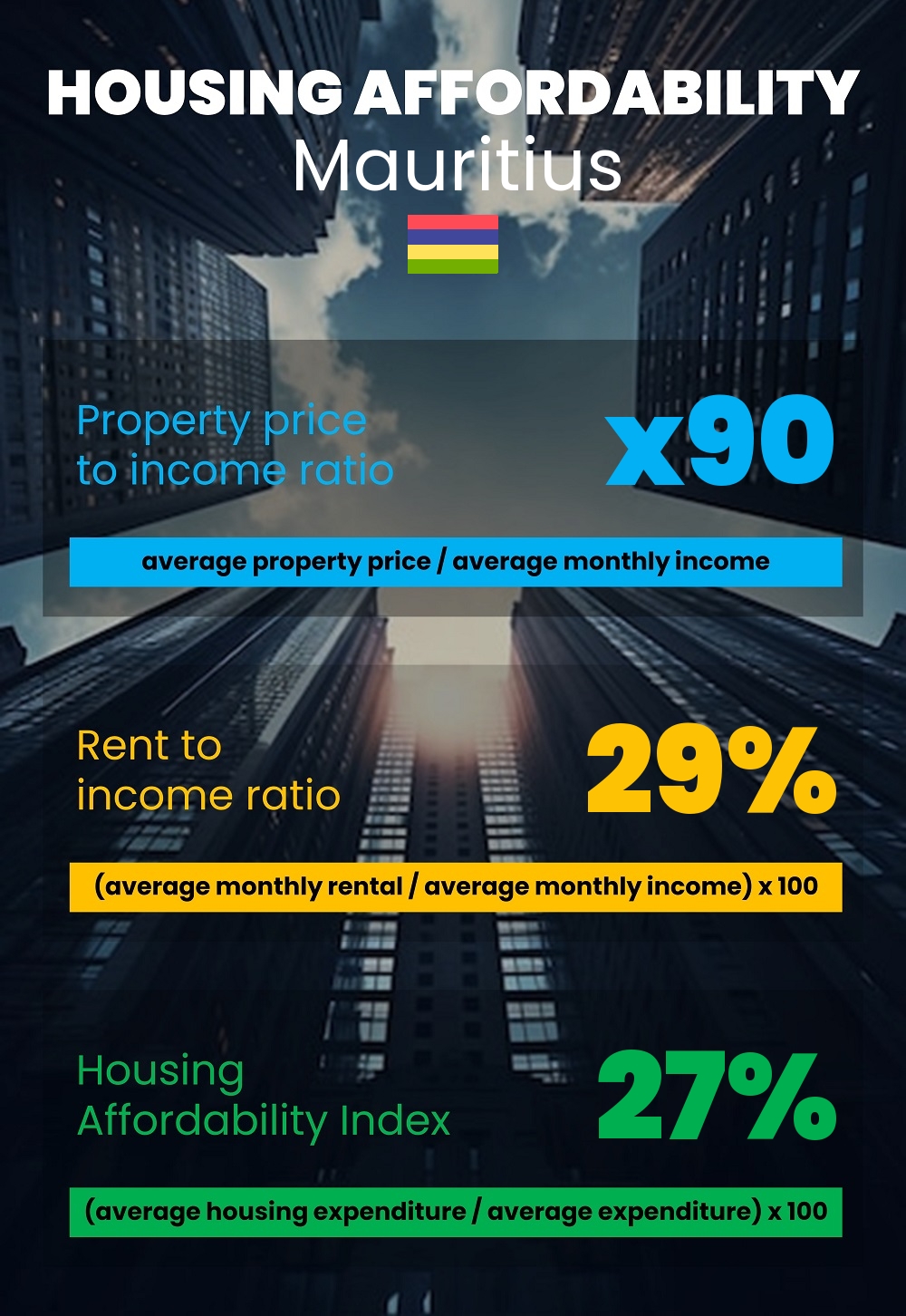
Housing costs, accommodation, and housing affordability in Mauritius
Rental costs and house/apartment prices can vary drastically between different areas and locations.
Rent Cost in Mauritius
Monthly Rent Prices

Studio apartment monthly rent cost
| 3,900 MUR | 5,800 MUR | 16,000 MUR |

1-bedroom apartment monthly rent cost
| 5,800 MUR | 9,300 MUR | 23,000 MUR |

2-bedroom apartment monthly rent cost
| 7,800 MUR | 12,000 MUR | 31,000 MUR |

3-bedroom apartment monthly rent cost
| 9,300 MUR | 16,000 MUR | 42,000 MUR |

Furnished apartment monthly rent cost
| 19,000 MUR | 47,000 MUR | 93,000 MUR |

Townhouse monthly rent cost
| 16,000 MUR | 23,000 MUR | 67,000 MUR |

House monthly rent cost
| 19,000 MUR | 47,000 MUR | 93,000 MUR |

Villa monthly rent cost
| 23,000 MUR | 58,000 MUR | 93,000 MUR |
The monthly rental cost of a studio apartment in Mauritius ranges between 3,900 MUR and 16,000 MUR, meanwhile the cost of monthly rental of a one-bedroom apartment can be anywhere from 5,800 MUR to 23,000 MUR. Two-bedroom rentals rate ranges between 7,800 MUR and 31,000 MUR per month. The monthly rental for a three-bedroom apartment ranges from 9,300 MUR to 42,000 MUR. The average rent of a townhouse in Mauritius is around 23,000 MUR while house rental costs can be as high as 47,000 MUR per month. Finally, if you want to rent a villa, expect to pay anywhere from 23,000 MUR to 93,000 MUR per month.
Apartment and house prices in Mauritius
Cost of buying a property

Studio apartment price
| 780,000 MUR | 1.2M MUR | 2.3M MUR |

1-bedroom apartment price
| 930,000 MUR | 1.6M MUR | 5.8M MUR |

2-bedroom apartment price
| 1.6M MUR | 4.7M MUR | 9.3M MUR |
| $34,000 | $100,000 | $200,000 |

3-bedroom apartment price
| 5.2M MUR | 7.8M MUR | 23M MUR |
| $110,000 | $170,000 | $510,000 |

Townhouse price

House price

Villa price
The average price of a studio apartment in Mauritius can range from 780,000 MUR to 2.3M MUR depending on location. One bedroom cost can be anywhere from 930,000 MUR to 5.8M MUR. A villa can cost you 52M MUR on average with prices ranging from 9.3M MUR to 78M MUR.
If you're leasing or purchasing, housing costs in Mauritius will probably constitute your biggest expenditure, yet it's an area where you wield considerable influence. This is due to the substantial variance in housing prices across communities. Keep in mind the location of your workplace and the accessibility of essential amenities to prevent negating the savings from lower rental rates with increased transportation expenses.
House / apartment prices to income ratio
Property price to income ratio
( average property price / average monthly income ) x 100
| 32 | x90 monthly income | 194 |
Property prices in Mauritius can be x90 to x194 multiples of the monthly income depending on the property and the income of the person. On average, property prices are approximately x90 multiples of the average monthly salary in Mauritius.
Rent to income ratio
Rent to income ratio
( monthly rental / monthly income ) x 100
The average rent-to-income ratio in Mauritius is around 29%. This means that people pay 29% of their income for rent. Those figures can range from 19% to 39% depending on the salary, location, and type of property.
The housing-to-income ratio is a very important metric to evaluate and measure how affordable living is in a particular area, city, or country since housing comprises the biggest chunk of expenditure. A higher housing to income ratio means that the place is relatively expensive. The figure by itself does tell much. It only starts to make sense when comparing the housing to income ratio across different locations.
Housing affordability index
The housing affordability index measures how affordable accommodation is in a particular place. This can measured in multiple ways, the most common being housing expenditure to total expenditure ratio and the rent to income ratio. The housing expenditure ratio is a figure reported by individuals on the percentage they allocate for housing. Rent to income ratio is calculated by dividing the average monthly rent by the average income. Because these values are both percentages, we can find their average and get the best of the two worlds.
Housing Affordability Index
27% Property Taxes
Real estate owners pay property taxes to local tax authorities, which are determined by the assessed value of their property. Typically, these taxes are paid once a year. Property tax funds contribute to community development, financing infrastructure improvements, public services, and local education initiatives.
Home Maintenance Costs
Home maintenance costs encompass various expenses associated with the upkeep and repair of a residence. These expenditures include regular tasks such as lawn care, pest control, and HVAC system servicing, as well as occasional repairs and renovations like fixing leaks, painting, or replacing appliances.
| 70 MUR | 700 MUR | 10,000 MUR |
Urban vs. rural living costs
Urban living typically entails higher housing and transportation costs due to demand and limited space, while rural areas generally offer lower housing expenses but may have higher prices for goods and services. The differnce in rental rates between urban areas and rural areas can be as high as 300% in some cases.
Monthly costs and expenses of energy and basic utilities in Mauritius
Utilities expenditure can vary slightly between different areas and locations.
Energy, electricity, water, gas, internet, and mobile cost in Mauritius

Utility Bill Cost / Electricity + Water + Gas / Individual
| 270 MUR | 1,900 MUR | 21,000 MUR |

Utility Bill Cost / Electricity + Water + Gas / Couple
| 280 MUR | 2,000 MUR | 23,000 MUR |

Utility Bill Cost / Electricity + Water + Gas / Family
| 520 MUR | 2,600 MUR | 26,000 MUR |

Internet and cable cost

Mobile phone bill and charges
Because most utility bills club electricity, water, and gas costs in one bill, we can't provide a breakup for each type of utility and will display electricity, gas, and water as single cost.
The average monthly expenditure for individuals on electricty, water, and gas in Mauritius ranges between 270 MUR and 21,000 MUR with average being 1,900 MUR, meanwhile the expenditure of couples is slightly higher at 2,000 MUR with 280 MUR and 23,000 MUR being the upper and lower limits respectively. As expected, the energy and water consumption of families is the highest among the three groups with an average of 2,600 MUR. The cost of internet and WiFi is unchanged among the three groups and ranges from 230 MUR to 620 MUR with 470 MUR being the average internet bill. Finally, the average monthly mobile charges is around 310 MUR but can range between 190 MUR and 930 MUR depending on consumption. Mobile charges include both calling minutes as well as data packages.
Energy / Utility expense to income ratio
( monthly utility expenses / monthly income ) x 100
The average utility-to-income ratio in Mauritius is around 6%. This means that people pay 6% of their income for energy, water, internet, and mobile charges. Those figures can range from 3% to 10% depending on salary and location.
























































































 Singles
Singles Couples
Couples Families
Families




















